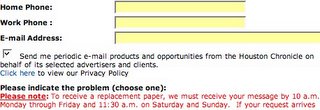Email marketing can be a great thing, but it's so often abused. Here's a recent experience of mine that stands as a case study in how not to use email marketing.
I recently got a promotional offer for a free month of
Audible.com service when I purchased an iPod accessory. Audible is a nifty idea; you can download audiobooks and other spoken word programming and listen to it on your iPod or computer. Great for long drives, plane trips, and all that, right?
So, I signed up. As part of the signup process I had to provide my email preferences. I opted in to some of the email but not all.
I started getting email from Audible. About an email every day or so. That's too much, far too much. So I signed back into Audible and removed some items. I still got a lot of email. So, I went back and told them: no email.
I kept getting email. Lots of it.
Next step: try the global remove instructions in the messages themselves.
I kept getting email. Lots of it.
This weekend, when one of the pestering emails showed up, I just replied in frustration. I got an automated message telling me that in order to make sure these replies are real, I needed to go to the Audible web site and fill out a form. Then, my email would be delivered and replied to.
Fine, fine. I clicked the link. I filled out the form, which asked me for my name, my Audible user name, and all that kind of stuff. I completed it and hit submit.
I then got a second form asking me to enter my user name and email address again. I complied.
This led to an error: my email address is already in the database, so it couldn't be accepted. (Well, no kidding, I'm already a registered user.) Apparently I was being asked to register again for some reason, even though I had just given them my valid user name (which I tested - it's correct).
Net result: it's impossible to actually communicate with Audible because their web forms are broken.
Here's the bottom line, business-wise. I'm not continuing as a paying member. I'm not even going to buy items occasionally from them. In fact, I am setting my spam filter to just kill anything that comes from them. I will never spend a penny with them, or do any kind of business with Audible.
Here's where Audible went wrong:
- When I opted in, they abused that by sending way too much untargeted, uninteresting email.
- When I tried to adjust my preferences, they ignored those preferences.
- When I tried to remove myself altogether, they ignored that and continued to send email.
- When I used their customer support system to let them know there was a problem, broken web forms kept me from contacting them.
It's a combination of bad faith and incompetence, and it's a reason to never trust Audible with my email address.
That's how you use email marketing to drive customers away. Don't make the mistakes that Audible makes.


